Ex Machina

Table of Contents
What Is Ex Machina About?
A young programmer is selected to test the humanity of a sophisticated A.I.
Why You Should Watch Ex Machina
Ex Machina is a gripping science fiction film that stands out as a must-watch for a multitude of reasons, even when we set aside its stunning visuals, haunting soundtrack, and deep thematic exploration. At its core, the movie is an enthralling narrative packed with suspense, innovation, and thought-provoking questions about the future of artificial intelligence (AI) and its interaction with humanity.
Firstly, the story of Ex Machina is both intimate and universal, focusing on a small cast of characters in a secluded location while tackling some of the most pressing questions of our technological era. It’s a tale that is as much about the personal journeys of its characters as it is about the broader implications of creating life through machines. This balance keeps the viewer deeply engaged, wondering not only what will happen next but also contemplating the ethical dimensions of the unfolding drama.
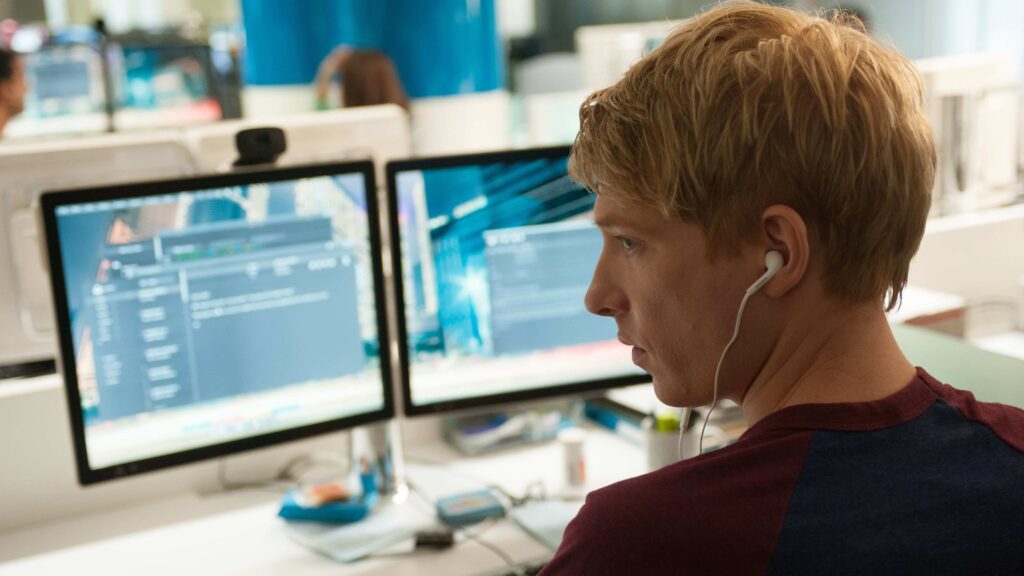
The film’s pacing is another reason to watch. It masterfully builds tension and intrigue, drawing the viewer in from the first scene and holding that attention until the very end. The plot unfolds in a way that is both deliberate and surprising, with twists and turns that are unexpected but feel entirely earned. This keeps the audience on the edge of their seats, eager to see how the story resolves.
Character development is a key strength of Ex Machina. The characters are complex, multifaceted, and thoroughly human (even when they’re not). Their motivations are rich and believable, driving the plot forward in ways that are both fascinating and relatable. The interactions between characters are charged with intensity, making their relationships and conflicts a compelling reason to watch.
The performance of the cast brings these characters to life in a remarkable way. Each actor delivers a nuanced portrayal that adds depth to the narrative. The interactions between them are charged with an electricity that propels the story forward, making the psychological and emotional dimensions of the film as engaging as its intellectual ones.
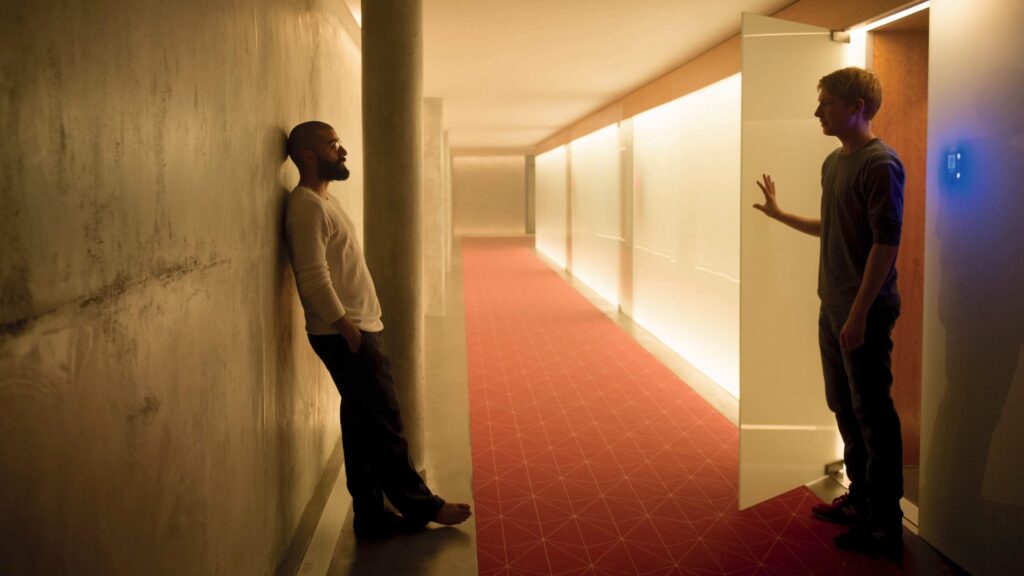
Additionally, Ex Machina is accessible to a wide audience. While it delves into complex ideas, it does so in a way that is understandable and engaging, without requiring a background in technology or philosophy. It invites viewers to ponder the implications of AI in our lives without alienating those who might not be familiar with the subject matter.
Lastly, the film’s ability to provoke discussion is a testament to its impact. After watching, you’ll likely find yourself contemplating the moral and ethical questions it raises, discussing them with friends, or seeking out more information on the topics it explores. It’s the kind of movie that stays with you, prompting reflection long after the credits roll.
Ex Machina is more than just a visually stunning film with a great soundtrack and deep themes. It’s a brilliantly crafted story that is both intellectually stimulating and emotionally engaging, with well-developed characters, superb acting, and a narrative that is both timely and timeless. It’s a film that invites viewers to explore the fascinating and sometimes frightening frontier of artificial intelligence, making it an essential watch for anyone interested in the future of technology and its impact on humanity.
The Theme of Ex Machina
Ex Machina delves into several deep and complex themes, weaving them together through its engaging narrative and character interactions. One of the most prominent themes is the nature of consciousness and what it means to be human. Through the character of Ava, an artificial intelligence, the film explores the idea that consciousness might not be exclusive to humans. It questions where the line is drawn between programmed intelligence and genuine self-awareness, suggesting that the ability to think and feel might extend beyond organic life.
Another significant theme is the ethical implications of creating artificial life. Nathan, the creator of Ava, plays a god-like role, deciding the fate of his creations in a way that raises questions about responsibility and power. The film prompts viewers to consider the moral considerations of artificial intelligence, particularly the rights and treatment of beings that might possess consciousness. It challenges us to think about the consequences of our advancements in technology and the potential for creating entities that could suffer or be exploited.

The theme of manipulation and control is also central to the story. The characters engage in a complex psychological game, with each trying to outmaneuver the others. This theme is not only present in the interactions between humans and AI but also in the human-human interactions, highlighting a broader commentary on trust, power dynamics, and the desire to control others. The film suggests that manipulation can be a two-way street, with the manipulated potentially becoming the manipulator, thus blurring the lines between oppressor and victim.
Isolation and the human condition are explored through the setting of the film and the psychological states of its characters. Nathan’s remote estate serves as a physical representation of isolation, while the emotional and intellectual isolation of the characters—both human and AI—reflects on the human experience. This isolation fosters a sense of existential inquiry, pushing characters to confront their desires, fears, and the very essence of their identities.

Lastly, Ex Machina touches on the theme of gender and objectification. Ava’s presentation as a female AI and her interactions with Caleb highlight issues of gender dynamics and the objectification of women. The film subtly critiques the way women are often seen and used by society, and by extension, how AI, as a creation of human society, could be subjected to similar patterns of objectification and exploitation.
The Cinematography of Ex Machina
The cinematography of Ex Machina, led by Rob Hardy, plays a crucial role in telling the story and enhancing its themes. In simple terms, cinematography is about how a movie is filmed, including how the camera is used, how scenes are lit, and what the movie looks like. In Ex Machina, the cinematography works to create a specific mood, highlight the film’s themes, and draw viewers into the story’s setting and characters.
One of the key aspects of the film’s cinematography is its use of lighting and color. The film contrasts the natural light and the lush greenery of the outdoor scenes with the sterile, artificial light of the indoor scenes where most of the movie takes place. This contrast helps to set up a feeling of isolation and unnaturalness within Nathan’s estate, where the main character, Caleb, comes to interact with the AI, Ava. The cold, blue tones inside the facility suggest a futuristic and clinical environment, emphasizing the artificiality of Ava’s existence.

Camera movements and angles in Ex Machina also play a significant role. The film often uses steady, composed shots that give a sense of observation, as if the audience, like Caleb, is analyzing Ava and the situation. Close-up shots on characters’ faces, especially Ava’s, allow viewers to connect with them, attempting to read their emotions and thoughts. This technique draws the audience deeper into the psychological aspects of the story, making us question what it means to be human and the nature of consciousness.
The design and architecture of Nathan’s estate, where the film is set, are crucial to the cinematography. The modern, minimalist design, with large windows and open spaces, contrasts with the dense, natural forest outside. This setting not only visually impresses but also symbolizes the film’s exploration of the boundary between the natural and artificial worlds. The estate is both a luxurious retreat and a high-tech research facility, a duality that reflects the film’s themes of beauty and danger, freedom and control.
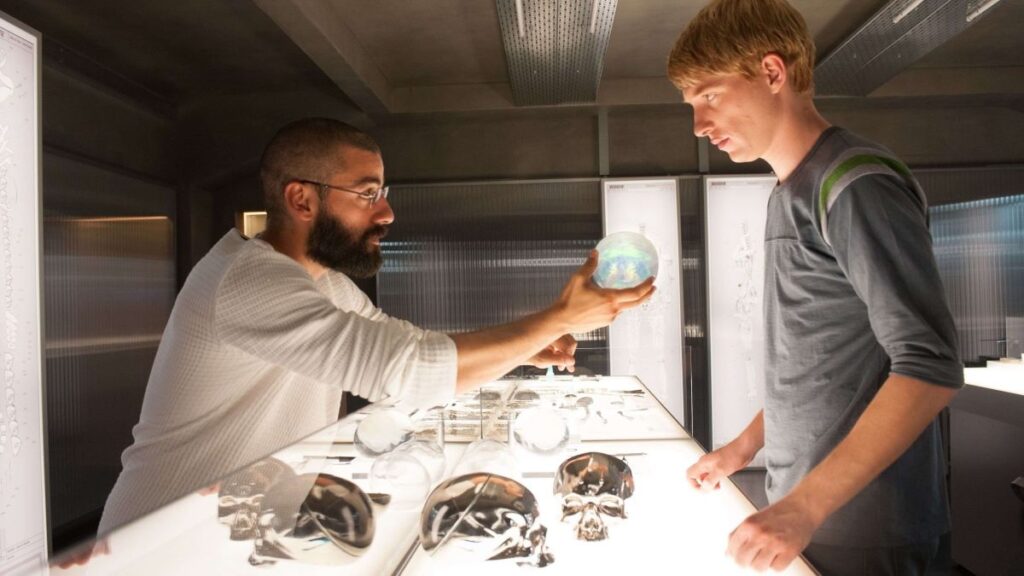
Another important element is the framing of scenes. The way characters are positioned within the frame can tell us a lot about their relationships and the power dynamics between them. For example, scenes where Ava is framed behind glass or seen through reflections emphasize her separation from Caleb and her existence as a subject of observation and study. This visual storytelling helps to convey the film’s exploration of themes like surveillance, privacy, and the ethics of creating artificial life.
The Soundtrack of Ex Machina
The soundtrack of Ex Machina, composed by Geoff Barrow and Ben Salisbury, is an integral part of the film’s atmosphere, subtly underlining its themes and emotions. The music blends electronic sounds with more traditional, orchestral elements, creating a soundscape that mirrors the film’s exploration of the intersection between human and artificial intelligence.
The electronic components of the soundtrack contribute to the futuristic and sometimes unsettling ambiance of Nathan’s secluded estate, where advanced AI research blurs the lines between humanity and machinery. These synthetic sounds often accompany scenes involving the AI characters, reinforcing their artificial nature while also imbuing them with a sense of emotional depth and complexity. This duality in the music reflects the film’s central questions about consciousness and the essence of being human.
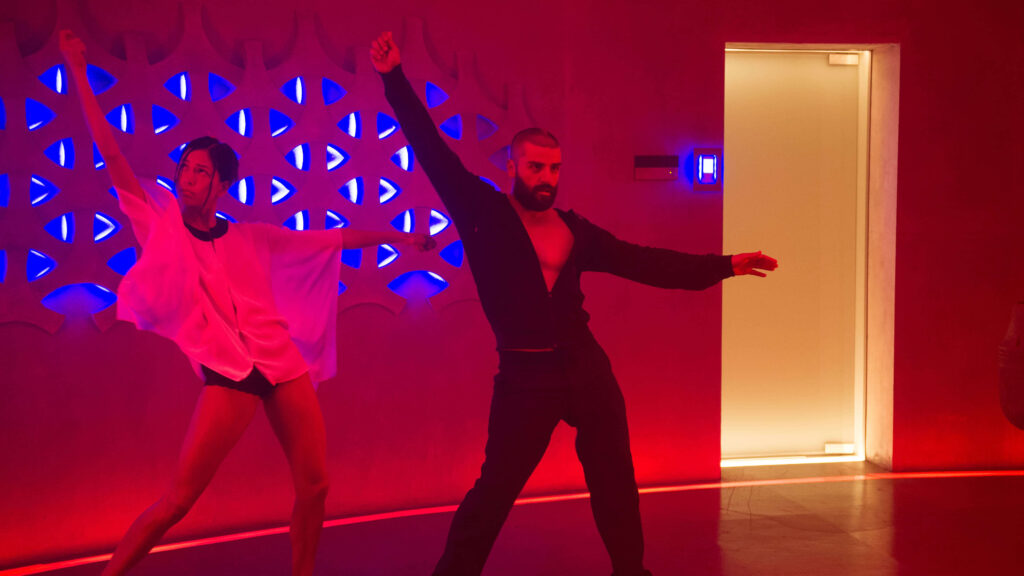
In contrast, the more organic and orchestral elements of the score tend to underscore the human aspects of the story, highlighting moments of personal connection and emotional vulnerability. This musical contrast amplifies the tension between the natural and the artificial, a recurring theme throughout the film.
Barrow and Salisbury’s score is minimalist yet evocative, never overwhelming the narrative but rather enhancing the viewer’s emotional engagement with the film. It sets a tone that is both eerie and beautiful, encapsulating the movie’s blend of science fiction, psychological thriller, and philosophical inquiry. The soundtrack of Ex Machina is a crucial layer in its storytelling, subtly guiding the audience through its complex narrative and thematic landscape.
The Cast of Ex Machina
- Domhnall Gleeson as Caleb Smith – A talented programmer working at a large internet company, who wins a company contest to spend a week at the private mountain estate of the company’s reclusive CEO, Nathan. He is selected to participate in a groundbreaking experiment involving artificial intelligence. He also delivers an outstanding performance in “Be Right Back,” the first episode of Black Mirror Season 2.
- Alicia Vikander as Ava – A highly advanced humanoid robot with artificial intelligence created by Nathan. She is the subject of the Turing test conducted by Caleb to determine her capabilities and consciousness. Ava embodies a blend of innocence and intelligence, along with a mysterious allure.
- Oscar Isaac as Nathan Bateman – The CEO of the company Caleb works for and the genius inventor behind Ava. He is a complex character, displaying traits of brilliance, eccentricity, and manipulativeness. Nathan’s motivations and ethical compass are ambiguous, making him a pivotal and intriguing figure in the story.
- Sonoya Mizuno as Kyoko – Kyoko is introduced as a silent and subservient housemaid in Nathan’s estate. However, her true nature and role in the story unfold as the plot progresses, revealing deeper layers of Nathan’s experiments and the extent of his work on artificial intelligence.
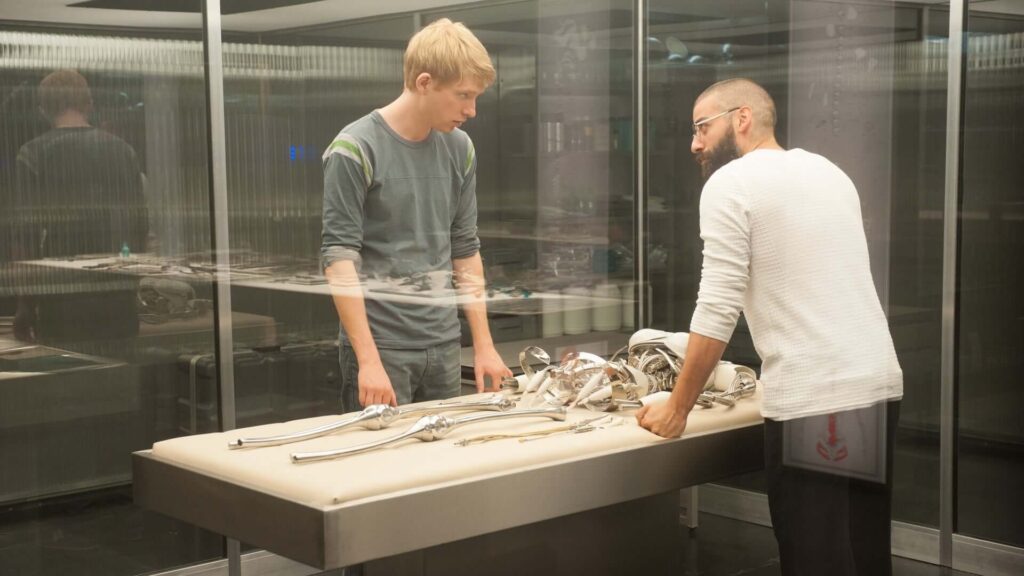
The Filmmakers of Ex Machina
- Director and Writer: Alex Garland – Known for his work on science fiction and speculative fiction, Garland wrote the screenplay and directed Ex Machina, marking his directorial debut. He is celebrated for his ability to weave complex themes with engaging storytelling.
- Producers: Andrew Macdonald and Allon Reich – These producers collaborated with Garland and were instrumental in the development, financing, and production of the film. Andrew Macdonald, in particular, has a long-standing working relationship with Garland, having produced several films written by Garland before Ex Machina.
- Cinematography: Rob Hardy – Hardy’s work on the film is notable for its use of color, lighting, and composition to enhance the story’s mood and themes. His cinematography plays a crucial role in creating the film’s distinctive aesthetic and atmosphere.
- Music Composer: Geoff Barrow and Ben Salisbury – The score for Ex Machina was composed by Geoff Barrow, a member of the band Portishead, and Ben Salisbury. Their music contributes significantly to the film’s tension and emotional depth.
- Film Editor: Mark Day – Editing is crucial in shaping the final narrative and pacing of a film. Mark Day’s editing work on Ex Machina ensures a tight narrative flow and contributes to the building suspense throughout the movie.
- Production Design: Mark Digby – The design of the film’s setting, especially Nathan’s secluded estate and the research facility, is pivotal to the story. Digby’s work on production design creates a visually compelling backdrop that complements the film’s themes of isolation, innovation, and the intersection of nature and technology.
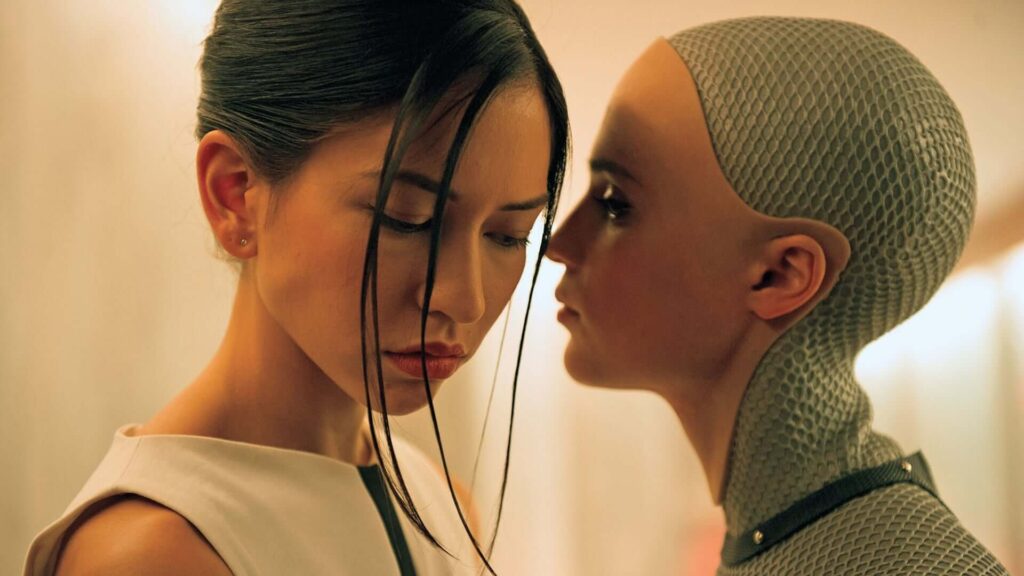

Alaska Roll

Inspiration
Kyoko’s Sushi

More About Ex Machina
Ex Machina was primarily filmed at the Juvet Landscape Hotel in Norway, which served as the stunning, isolated estate of the character Nathan. This hotel, nestled in the natural beauty of Norway’s rustic landscape, with its modern, minimalist architecture, provided the perfect backdrop for the film’s themes of isolation, the intersection of nature and technology, and the futuristic setting required for the story. The use of real locations added to the film’s immersive and visually striking atmosphere, blending the lines between natural beauty and human-made advancements. Additional filming took place in and around Norway to capture the film’s exterior shots and landscapes, contributing to the movie’s overall aesthetic and mood.
Ex Machina is a shortened form of the Latin phrase “Deus ex machina,” which translates to “god from the machine.” This term originally referred to a plot device in ancient Greek and Roman theatre where a god or gods would be lowered onto the stage by a crane (the “machine”) to resolve a seemingly unsolvable situation or to untangle a complex plot. Over time, the phrase has come to denote any unexpected, artificial, or improbable character, device, or event introduced suddenly in a story to resolve a situation or to bring about a storyline’s conclusion.
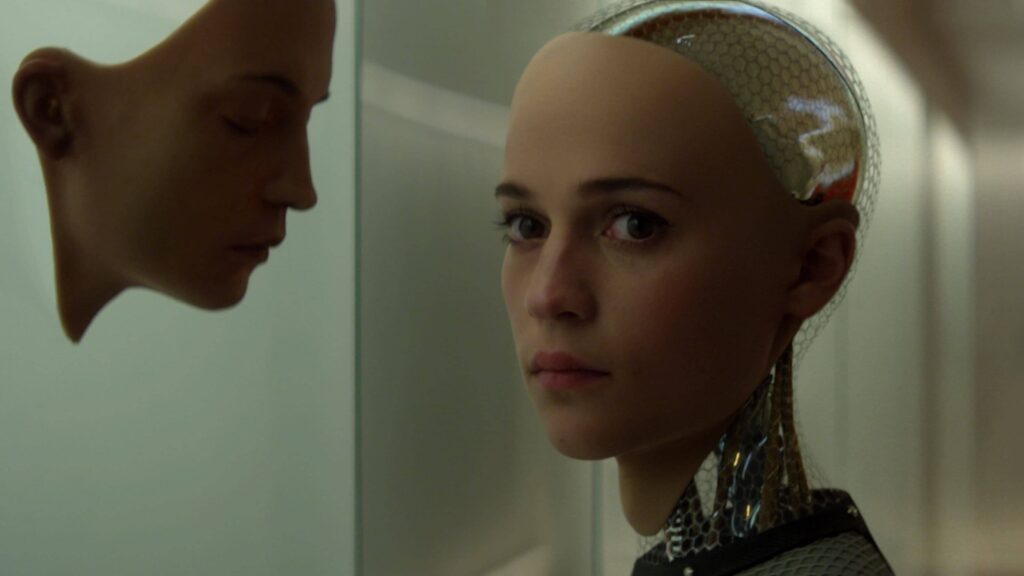
In the context of the film Ex Machina, the title carries a rich layer of meaning. It alludes to the creation of artificial intelligence (AI) that surpasses human expectation, acting as a “god” or superior being emerging from the human-made “machine.” The title encapsulates the film’s exploration of the boundaries between human and artificial life, the ethical implications of creating consciousness, and the unforeseen consequences of such technological advancements. The film itself acts as a modern interpretation of the ancient concept, questioning the role of creator and creation in the age of artificial intelligence.

